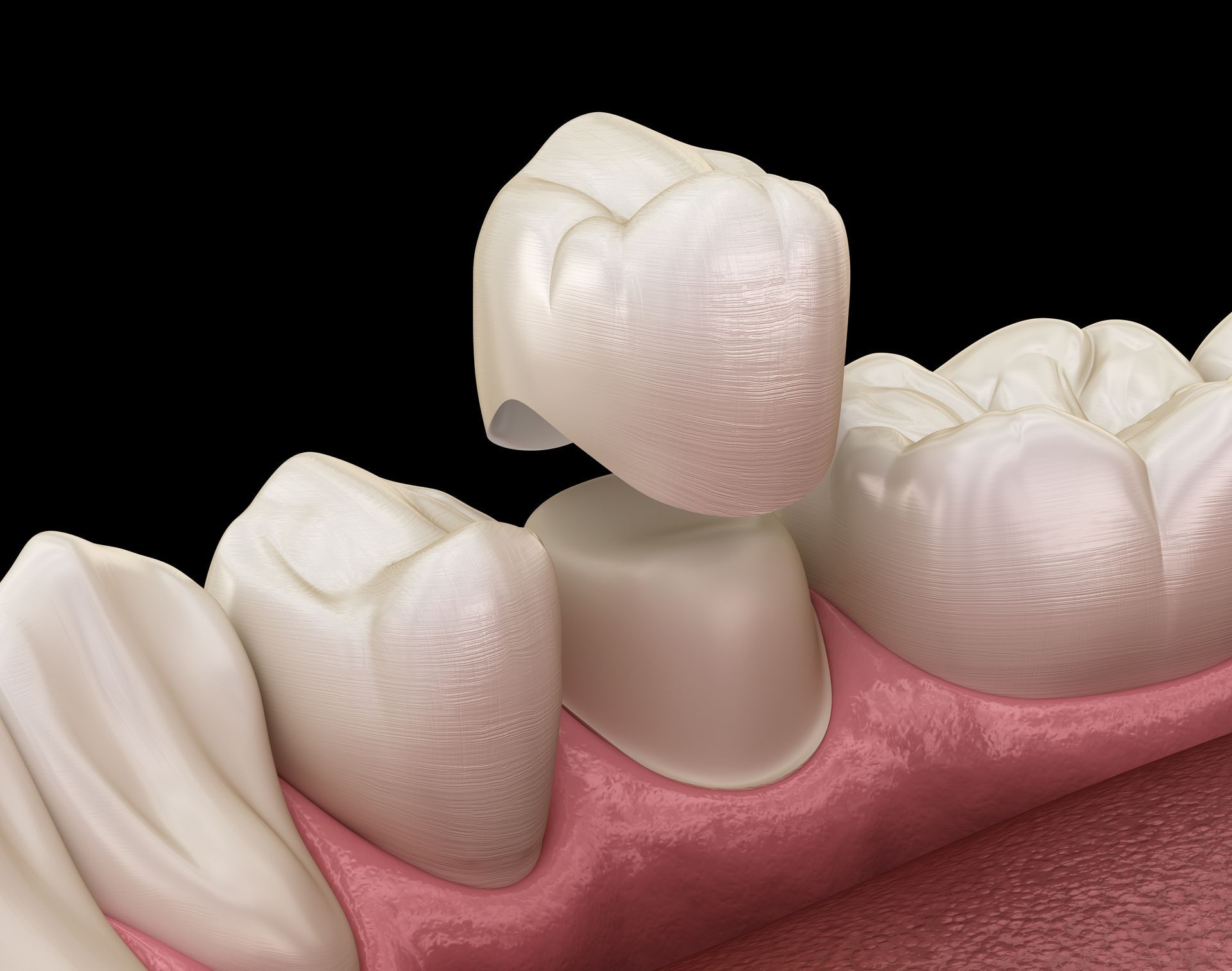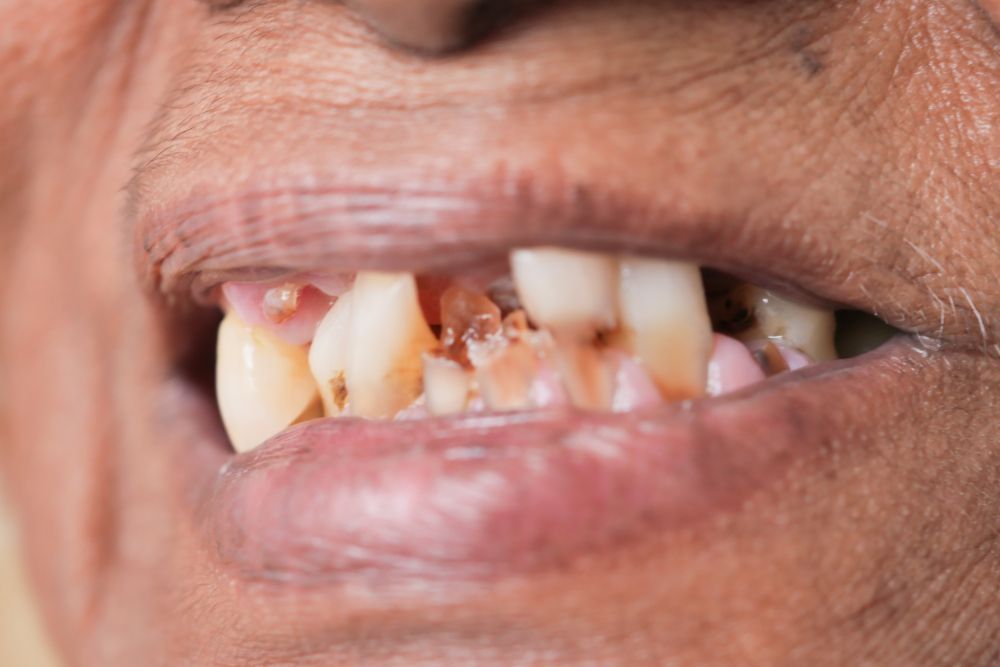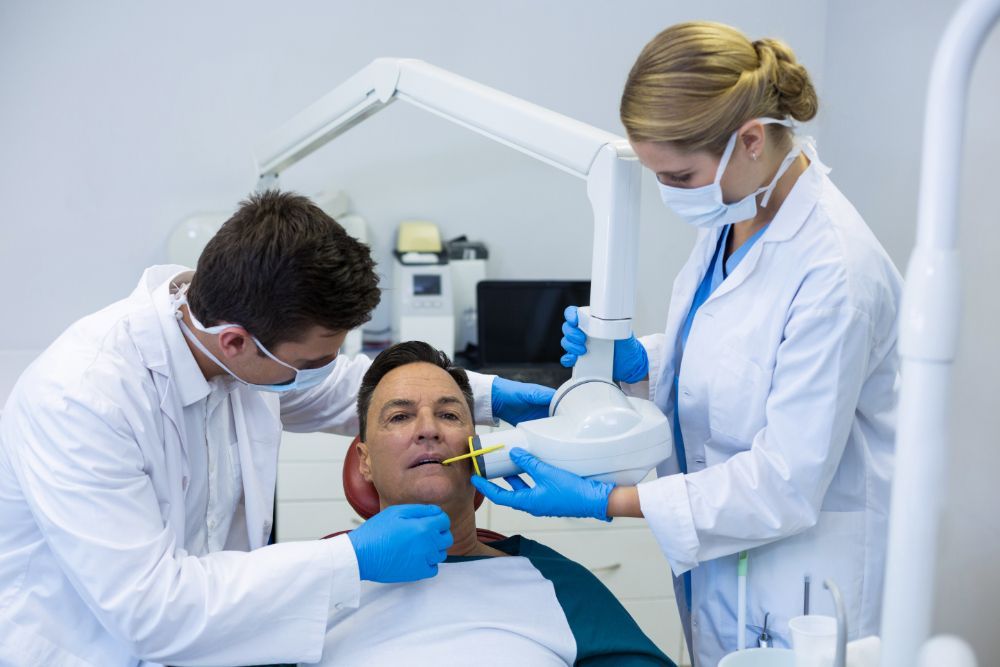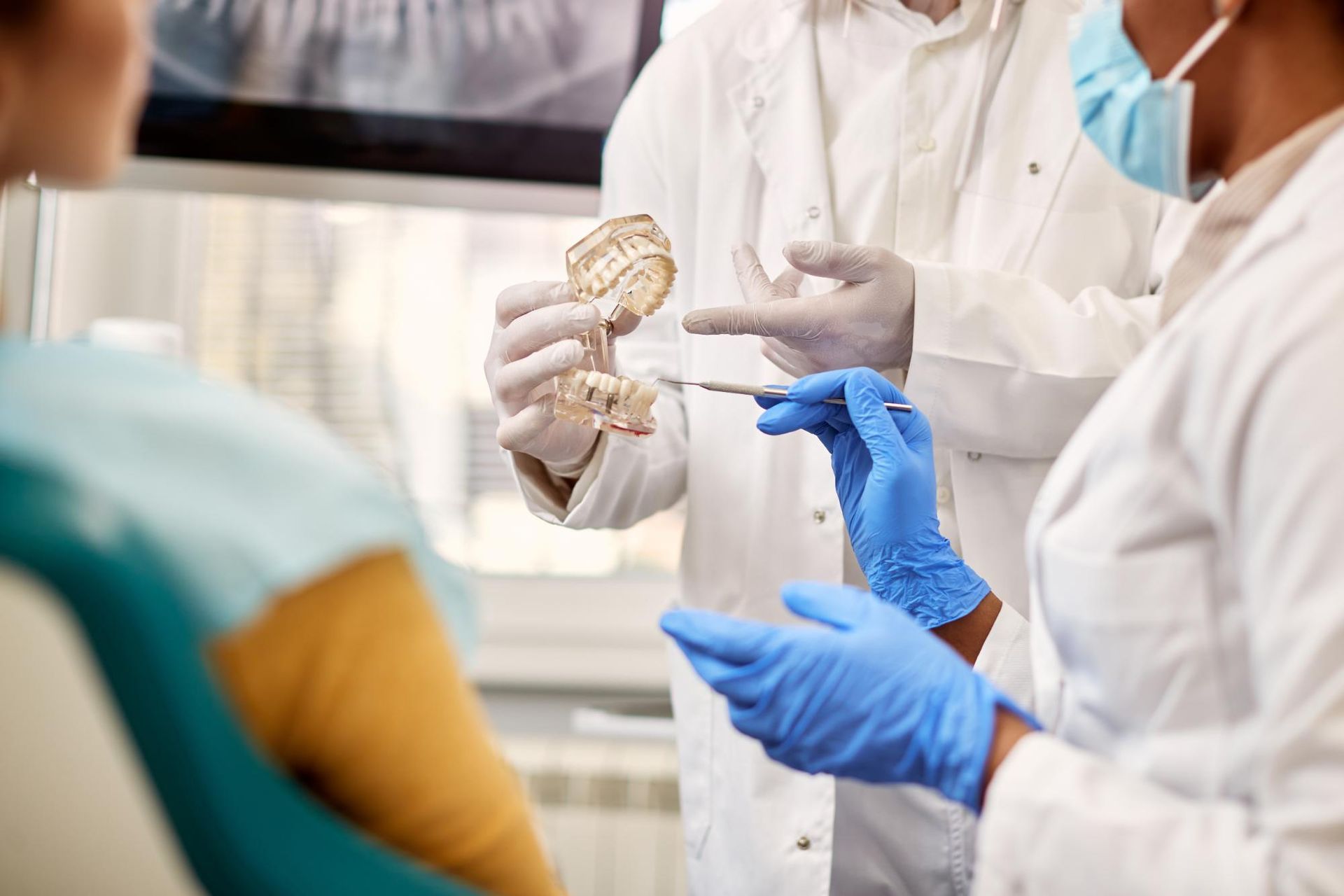Contact Information
smiles@mylakesidedentist.com
15400 19 Mile Rd, Clinton Twp, MI 48038, United States of America
Serving Clinton Township and Surrounding Areas
info@mylakesidedentist.com
(586) 228-0909
Top Dentist Who Specializes in Crowns: How They Can Help You Restore Your Smile
19 Minute Read
Looking for a dentist who specializes in crowns? You’re in the right place. This guide will help you understand what to expect from a specialist, the types of crowns available, and how to pick the best dentist for your needs. Let’s get started on restoring your smile.
Key Takeaways
- Dental crowns are vital for restoring damaged teeth, providing protection, strength, and aesthetic improvements through options like porcelain, metal, and ceramic.
- Crowns are necessary in various situations, such as significant tooth decay, damage, or post-treatment protection, to maintain oral health and function.
- Choosing the right dental specialist is crucial for crown procedures, with general dentists, prosthodontists, and cosmetic dentists each offering unique expertise.
Understanding Dental Crowns

Dental crowns are robust tooth covers designed to protect and restore the functionality and appearance of damaged teeth. Think of them as a protective helmet for your teeth, shielding them from further harm while enhancing their look. These dental crown covers can be crafted from various materials, with porcelain being a popular choice due to its close resemblance to natural tooth enamel. Each type of crown offers unique benefits, catering to different needs and preferences.
Porcelain crowns, for instance, are celebrated for their natural look, closely mimicking the color and translucency of natural teeth. In contrast, metal crowns are renowned for their exceptional strength and durability, making them an excellent choice for molars that experience significant chewing pressure. Ceramic crowns strike a balance, offering both aesthetic appeal and functional durability.
By understanding these options, you can make a well-informed choice that aligns with your dental needs and lifestyle.
Porcelain Crowns
Porcelain crowns are designed to closely resemble natural tooth enamel, making them a top choice for those seeking a seamless blend with their natural teeth. These crowns are not only functional but also serve a cosmetic purpose, improving the appearance of misshapen or severely stained teeth.
Porcelain crowns offer a dual benefit by enhancing the aesthetics of teeth and restoring function, ensuring a natural, beautiful smile.
Metal Crowns
Metal crowns are known for their strength and longevity, making them an excellent choice for restoring damaged teeth that require a durable solution. Typically made from metals like gold, palladium, nickel, and chromium, these crowns can withstand the rigors of chewing and biting without wearing down.
Their durability makes them particularly suitable for non-visible back teeth, where functionality takes precedence over aesthetics.
Ceramic Crowns
Ceramic crowns are the epitome of aesthetic dental solutions, offering a beautiful transparency that closely mimics natural tooth enamel. These crowns are particularly suited for visible front teeth due to their excellent aesthetics.
Materials like zirconium dioxide are commonly used to make these durable porcelain crowns, ensuring they provide both strength and a natural look.
When Do You Need a Dental Crown?

Dental crowns become necessary in various scenarios, often when other dental treatments are insufficient. Here are some common situations that may necessitate a crown:
- Significant tooth decay that large fillings cannot address
- Repairing cracked, chipped, or broken teeth, providing the necessary structural support to prevent further damage
- Protecting a tooth that has undergone a root canal from the greater bite pressure exerted on back teeth
In some cases, a crown might be the best option to replace a large, worn-out filling that covers more than two-thirds of the tooth’s width. Dental crowns provide a sturdy and long-lasting solution, ensuring the restored teeth can function normally and withstand everyday use.
Whether it’s due to decay, damage, or post-procedure protection, crowns offer a reliable solution to maintain oral health and function.
Restoring Damaged Teeth
Dental crowns are invaluable in restoring damaged teeth by providing essential reinforcement and protection. They serve to strengthen weak teeth, support cracked ones, and restore worn-down or broken teeth effectively. Crowns cover the damaged tooth, preventing further deterioration and enabling the tooth to withstand normal chewing forces.
This dual role of protection and reinforcement makes crowns a preferred solution for extensively damaged or compromised teeth.
Replacing Missing Teeth
Crowns are often utilized in dental implant and bridges to replace missing teeth, offering both functional and aesthetic benefits. They can cover root canal-treated teeth and dental implants, ensuring a seamless integration with natural teeth and restoring the full functionality of the mouth.
Crowns fill gaps left by missing teeth, helping to maintain the alignment of other teeth and preventing issues like difficulty in chewing and speaking.
Types of Dentists Who Specialize in Crowns

When it comes to dental crowns, several types of dentists can provide the necessary expertise. General dentists are often the first point of contact, handling basic crown placements and referring complex cases to specialists. Prosthodontists, with their advanced training in prosthetic dentistry, are the go-to experts for treating complex dental conditions and crafting custom crowns. Cosmetic dentists, on the other hand, focus on the aesthetic aspects, ensuring that crowns enhance the overall smile.
When it comes to dental crowns, several types of dentists can provide the necessary expertise:
- General dentists are often the first point of contact, handling basic crown placements and referring complex cases to specialists.
- Prosthodontists, with their advanced training in prosthetic dentistry, are the go-to experts for treating complex dental conditions and crafting custom crowns.
- Cosmetic dentists, on the other hand, focus on the aesthetic aspects, ensuring that crowns enhance the overall smile.
Choosing the right dentist is vital for effective treatment. A good reputation and expertise in crown procedures are key. Patient reviews provide valuable insights into a dentist’s skill and patient satisfaction. Understanding the roles of different dental professionals helps in making an informed choice for your dental care.
General Dentists
General dentists play a pivotal role in restoring the functionality and appearance of teeth through basic restorative services, including the fitting of dental crowns. They recommend solutions, guide patients in their choices, and often handle straightforward crown procedures. Reviews from previous patients can provide insights into the quality of care and satisfaction, helping new patients gauge a dentist’s performance.
General dentists contribute significantly to maintaining overall oral health through their comprehensive care as a general dentist.
Prosthodontists
Prosthodontists are specialists in the art of dental prosthetics, often consulted for complex crown cases. Their focus on prosthetic dentistry includes restoring and replacing teeth with precision-crafted crowns and bridges.
With advanced training in treating complex dental conditions, prosthodontists are adept at crafting custom crowns that fit perfectly and function seamlessly. Their expertise makes them the ideal choice for patients requiring specialized dental care.
Cosmetic Dentists
Cosmetic dentists prioritize the visual aspects of dental crowns, ensuring they match the patient’s natural tooth color and enhance their smile. Accreditation from the American Academy of Cosmetic Dentistry can signify a dentist’s advanced expertise in cosmetic procedures. Cosmetic dentists focus on aesthetics to help patients achieve a more attractive and confident smile.
The Process of Getting a Dental Crown
The journey to getting a dental crown typically involves multiple appointments over a few weeks. During the initial consultation, the dentist evaluates the patient’s dental health, reviews medical history, and discusses treatment options related to dental surgery. This thorough examination may include taking digital X-rays and creating a treatment plan based on the findings.
Once the plan is set, the next step is preparing the affected tooth. Preparing the tooth involves numbing the area, removing any decay, and reshaping the tooth to fit the custom crown. Impressions are taken to ensure the crown fits perfectly. After the tooth is prepared, a temporary crown may be placed to protect it until the permanent crown is ready.
- Numb the area around the affected tooth.
- Remove any decay from the tooth.
- Reshape the tooth to fit the custom crown.
- Take impressions to ensure the crown fits perfectly.
- Place a temporary crown to protect the tooth until the permanent crown is ready.
The final step is the placement of the permanent crown, where dental cement is used to bond it securely to the tooth. This process ensures that the crown remains stable and functional for years.
Initial Consultation
During the initial consultation for a dental crown, the dentist will evaluate the patient’s dental health and discuss treatment options. This comprehensive examination includes a review of medical history and taking digital X-rays to assess the affected tooth.
Based on the examination findings, the dentist creates a treatment plan, which may involve taking impressions of the tooth to design a custom crown.
Preparing the Affected Tooth
The dentist begins by numbing the area to ensure the patient’s comfort before preparing the affected tooth. Next, any decay is meticulously removed, and the tooth is reshaped to accommodate the crown. Impressions of the tooth are then taken to fabricate a custom crown that fits precisely.
This careful preparation is crucial for ensuring the crown’s durability and effectiveness.
Placement of the Permanent Crown
In the final appointment, the permanent crown is placed onto the prepared tooth. Dental cement is used to bond the crown securely in place. The dentist will ensure that the crown fits comfortably and make any necessary adjustments before finalizing the procedure.
This bonding process is critical for the crown’s stability and functionality, allowing it to perform like a natural tooth.
Benefits of Dental Crowns
Dental crowns provide numerous advantages, making them a favored option for restoring damaged teeth. They significantly enhance the aesthetic appeal of a smile by covering imperfections and providing a more natural look. Once the permanent crown is placed, the restoration process is complete, allowing the patient to use their tooth normally. Additionally, crowns can be less abrasive on the teeth they come into contact with, preventing further wear.
The strength and stability provided by dental crowns are unmatched. They play a crucial role in restoring the functional integrity of damaged teeth, enabling normal chewing and biting functions. Made from durable materials like metal and porcelain, crowns are designed to resist wear and can last for many years with proper care. This longevity and durability ensure that patients can enjoy the benefits of their restored smile for a long time.
Enhanced Appearance
One of the most significant benefits of dental crowns is their ability to enhance the appearance of teeth. Crowns can conceal severely stained or discolored teeth, leading to a brighter and more uniform smile. Crowns improve the overall appearance of teeth affected by staining, contributing to a more attractive and confident smile.
This cosmetic enhancement is especially beneficial for those with misshapen or damaged teeth, as crowns can restore both functionality and beauty.
Strength and Stability
Dental crowns are known for their strength and stability, making them an ideal solution for restoring damaged teeth. Metal crowns, in particular, endure biting and chewing forces well and require minimal enamel removal during placement.
Crowns restore the structural integrity of the tooth, enabling normal function post-restoration and allowing patients to chew and bite with confidence.
Longevity and Durability
The longevity and durability of dental crowns are key factors in their popularity. When crafted from high-quality materials like porcelain and metal, crowns can last for many years, often between 10 to 20 years with proper maintenance.
Porcelain-fused-to-metal crowns offer a robust solution that blends the strength of metal with the visual appeal of porcelain. With appropriate care, crowns ensure long-lasting restorations that provide both functionality and aesthetics.
Choosing the Right Dentist for Your Crowns
Choosing the right dentist for your dental crowns is crucial for a successful outcome. It’s important to consider the dentist’s specialization, experience, and qualifications to assess their ability to perform crown procedures. Open communication and thorough consultations can significantly enhance your dental experience, ensuring you understand the materials used, the estimated timeline, and any potential side effects. Practical considerations such as location and office hours also contribute to the convenience of maintaining dental visits.
Selecting a dentist with a good reputation and expertise in crown procedures is essential for effective treatment. Patient reviews offer valuable insights into a dentist’s skill and patient satisfaction. Effectively managing the consultation process ensures you find a suitable dentist for your crown procedures, ultimately leading to a successful and satisfactory dental experience.
Checking Credentials
Checking a dentist’s credentials is a critical step in ensuring they have the expertise to meet your needs. A dentist’s qualifications and certifications are essential indicators of their ability to perform crown procedures safely and effectively. Verifying a dentist’s credentials can include checking for membership in the American Dental Association, which signifies adherence to professional standards.
This verification process helps in selecting a qualified professional for your dental care.
Reading Patient Reviews
Patient reviews are an invaluable resource for making informed decisions about dental care. These reviews provide firsthand accounts of experiences, highlighting the quality of care received, the dentist’s chairside manner, and the overall office environment.
While reading patient reviews, it’s important to verify the dentist’s credentials, which can be supported by positive patient experiences. Reviews also often mention convenience factors, such as location and scheduling ease, which can greatly impact the patient’s choice.
Considering Location and Convenience
Choosing a dentist who is located nearby can significantly reduce travel time and effort, especially for multiple visits required for crown procedures. Proximity to the dental office can greatly enhance the convenience of attending scheduled appointments and follow-ups.
Selecting a dentist close to home ensures that maintaining your dental visits becomes a seamless part of your routine. This practical consideration plays a vital role in ensuring consistent and timely dental care.
Summary
Dental crowns are a versatile and effective solution for restoring damaged or missing teeth. They offer numerous benefits, including enhanced appearance, strength, stability, and longevity. Understanding the different types of crowns and the process of getting one can help you make an informed decision. Choosing the right dentist, considering their credentials, patient reviews, and convenience, is crucial for a successful outcome. Embrace the journey to restore your smile with confidence, knowing that dental crowns provide a reliable and long-lasting solution.
Frequently Asked Questions
-
What are dental crowns used for?
Dental crowns are primarily utilized to protect and restore damaged teeth, as well as to enhance their appearance. Additionally, they play a critical role in dental implants and bridges for replacing missing teeth.
-
How long does the process of getting a dental crown take?
The process of getting a dental crown generally takes two to three appointments over a few weeks, which involves consultation, tooth preparation, and the placement of the permanent crown. It is essential to plan accordingly to accommodate this timeline.
-
What are the different types of dental crowns available?
There are several types of dental crowns available, including porcelain, metal (such as gold, palladium, nickel, and chromium), and ceramic. Each material presents distinct advantages, balancing aesthetics with durability.
-
How long do dental crowns last?
Dental crowns can last 10 to 20 years depending on the material used; metal crowns may last 15 to 20 years, whereas porcelain and ceramic crowns generally last about 10 years or more with proper care.
-
How do I choose the right dentist for my dental crowns?
Choose the right dentist for your dental crowns by evaluating their specialization, experience, and patient reviews, while also considering practical factors such as location and convenience for consistent care. This approach will ensure you receive quality treatment tailored to your needs.








CONTACT US FOR A FREE CONSULTATION
Ready to Take the Next Step Towards a Full, Vibrant smile?
Start your journey towards exceptional dental care. Our mission is to help you unlock your perfect smile and embrace the essence of quality dentistry at its finest.

Contact Information
Request a Free Consultation
For more information about our services or to schedule an appointment, call us at (586) 228-0909 or complete the form below we’ll get back to you as soon as we can.
Our Services
Quick Links
Contact Information
smiles@mylakesidedentist.com
15400 19 Mile Rd Suite 180
Clinton Township, MI 48038
All Rights Reserved | Lakeside Family & Implant Dentistry





